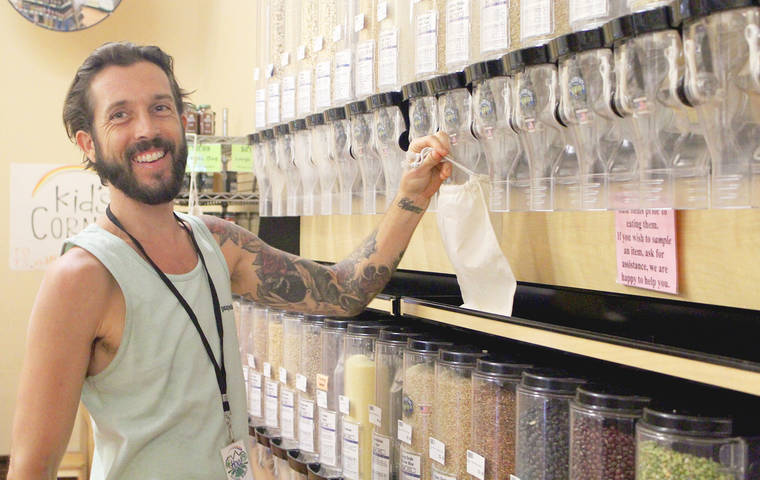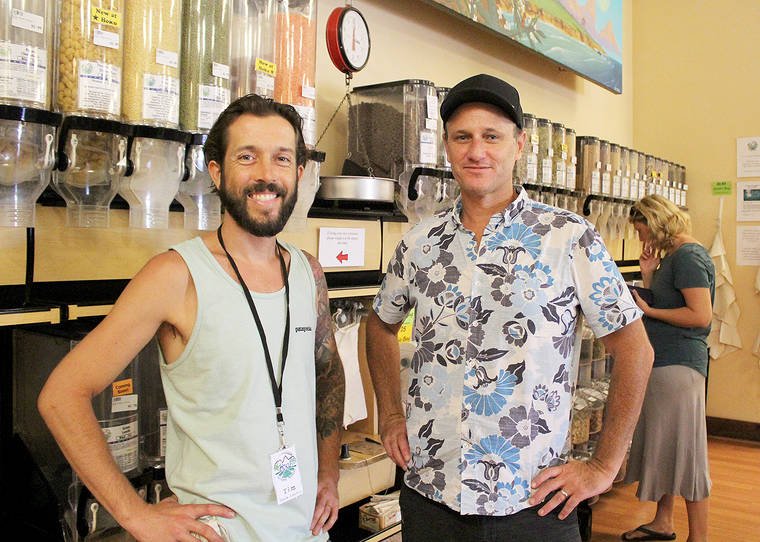KAPAA — Single-use plastics come in all shapes and sizes and in the effort to reduce the amount of plastic going into landfills and the environment, grocers are developing a new strategy: BYOB.
Bring Your Own Bag — or jar, whatever container you use to store your bulk food when you bring it home from the store. Grocer giant Whole Foods does it at some locations, as do some grocers in Europe.
It’s a growing trend also known as zero waste bulk shopping and now there are three natural grocers that allow you to bring your own container to the bulk food aisle.
The Healthy Hut in Kilauea and Papaya’s Natural Foods both allow customers to bring in containers from home. Employees say customers should just drop by the register first to weigh those containers before filling them up.
That’s the same practice that started in March at Hoku Foods and six months later, the grocer has reduced the number of single-use plastic bags they’ve sent out of their store by more than half.
They’re taking it a step further than offering bags for regular groceries at the register. They also found a way to help clean Kauai’s beaches while they’re at it.
“We still do have some compostable plastic bags for the bulk,” said owner Erik Pendelton. “We’re charging a nickel to use those and all of that goes to the (Kauai) Surfrider Foundation.”
Surfrider Foundation Kauai Chapter hosts cleanups islandwide and pulls thousands of pounds of plastic off of Kauai beaches annually.
The idea for bringing your own bulk containers at Hoku came from manager Tim Schulte, who considered the concept for some time before he made the suggestion.
“We found a way to match the program up with the point-of-sale system, subtracting the weight of the containers from the purchase and the register,” Schulte said. “That was the hardest part.”
Now, you have three options for buying bulk food at Hoku — bring your own container, pay 5 cents to use a compostable plastic bag for your purchase or pay for reusable, organic cotton bags.
Pendelton says they don’t make any money off of the organic reusable bags, it’s just a better option than compostable plastic.
“Even though the bulk plastic bags are compostable, it’s not good enough,” said Pendelton. “Look at all the scenarios and some of them will end up in our ocean and landfill.”
The staff at Hoku says the community is responding responsibly to the program.
Containers are coming into the store clean and ready to be filled, reusable bags are returning — for the most part.
“It just takes time to form the habit,” Schulte said.
A few months before the March 31 beginning of the program, Hoku sent out an information sheet that brought customers up to speed on the new plan.
There was only a slight amount of push-back.
“Once we explained that the money we’re charging for those compostable plastic bags is going to Surfrider and to cleaning up the beaches, everyone understands,” Schulte said.
Apryl Whitehead, general manager of Living Foods Market in Poipu, said most of their regulars bring in their own bags, and many tourists do, too.
She said Living Foods does not charge extra for using a brown bag, but it does ask if customers are going to return, to bring it back. They also offer reuseble bags for purchase.



